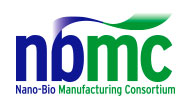
As part of the project, at least one analytical method, including offline immunoassay or mass spectrometry-based, will be developed to determine the levels of each of several AFRL-preferred biomarkers in sweat samples collected from multiple skin regions. Two molecules, one small and one large protein, will be selected for analysis from the following biomarkers: Orexin-A (impacts arousal and alertness); Neuropeptide Y (associated functions include stress reduction and lowering pain perception); Interleukin 6 (stimulates immune response); cortisol (released in response to stress); and Oxytocin (associated with various reproductive and bonding functions).
Because the biomarker levels may be low and thus more difficult to detect by some analytical techniques, different methods for sweat concentration and purification will also be assessed. The various sweat collection methods will then be assessed for the desired volume, under a variety of conditions, including whole-body hyperthermia.
Esther Sternberg, M.D., project technical lead and AzCIM director of research, noted, “Participating in this program is a natural extension of AzCIM’s research focus on mind-body science. Brain-immune connections are critical in decision-making and alertness, which can be greatly compromised by stress and fatigue, particularly for military personnel and others in high-pressure situations. Trauma related immune activation can also directly compromise performance and brain function. Devising a way to accurately detect these parameters in real time before problems set in, is essential to helping ensure physical and mental wellness for these individuals.”
In addition to Dr. Sternberg, the AzCIM project team includes Min Jia, Ph.D., AzCIM research assistant professor, as alternate technical representative. The AFRL program manager for the project is Laura Rea.
“Reproducibly collecting and analyzing sweat in a range of conditions and scenarios is a central challenge of enabling human performance monitoring,” said Dr. Benjamin Leever, AFRL Lead for Additive Manufacturing of Functional Materials. “This capability could significantly impact a large variety of Air Force missions.”
“AzCIM and Dr. Sternberg possess a sterling reputation for successful collaboration on initiatives that investigate the relationship between wellness and one’s environment,” said NBMC CEO Malcolm Thompson. “Ensuring that we are looking at the right biomarkers and collecting samples in the most optimal manner provides a crucial foundation for helping achieve NBMC’s objective to develop a technology platform for a lightweight, low-cost, wearable biosensor patch.”
About NBMC
The Nano-Bio Manufacturing Consortium (NBMC) was formed by the FlexTech Alliance, in collaboration with a nationwide group of partners, for the U.S. Air Force Research Laboratory (AFRL). The mission of the partnership is to bring together leading scientists, engineers, and business development professionals from industry and universities in order to work collaboratively in a consortium, and to mature an integrated suite of nano-bio manufacturing technologies to transition to industrial manufacturing. Initial activities focus on AFRL/ DoD priorities, e.g., physiological readiness and human performance monitoring. Specifically, NBMC matures nano-bio manufacturing technologies to create an integrated suite of reconfigurable and digitized fabrication methods that are compatible with biological and nanoparticle materials and to transition thin film, mechanically compliant device concepts through a foundry-like manufacturing flow. The long-term vision is that NBMC operates at the confluence of four core emerging disciplines: nanotechnology, biotechnology, advanced (additive) manufacturing, and flexible electronics. The convergence of these disparate fields enables advanced sensor architectures for real-time, remote physiological and health/medical monitoring.
CONTACT: Lisa Gillette-Martin, MCA Public Relations, Phone: 650-968-8900, ext. 115, Email: lgmartin@mcapr.com
